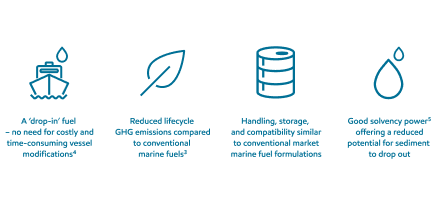A lower GHG emission fuel
ExxonMobil supports the International Maritime Organization’s (IMO) ambition to reduce total annual greenhouse gas (GHG) emissions from international shipping by 2050.1 ExxonMobil also remains focused on advancing lower GHG emission solutions, with a goal of supplying 200,000 barrels per day of lower GHG emission fuels by 2030,2 including bio marine fuel blends.
Our bio marine fuels are IMO 2020 compliant grades that combine a sulphur or distillate fuel with Fatty Acid Methyl Ester (FAME) bio component. ExxonMobil’s bio marine fuel blends not only comply with the IMO’s global 0.50% sulphur cap, but also can reduce lifecycle GHG emissions, compared to conventional marine fuels.3

These features enable vessel operators to bunker a high-quality, lower GHG emission fuel that also supports the IMO’s ambition to reduce total annual GHG emissions from international shipping.
To date, we have successfully supplied ExxonMobil bio marine fuel oil blends in Singapore and Amsterdam-Rotterdam-Antwerp (ARA) bunkering hubs. We at ExxonMobil are working every day to help our customers determine their best route towards meeting the IMO’s GHG emissions reduction goals.
1 https://www.imo.org/en/MediaCentre/HotTopics/Pages/Cutting-GHG-emissions.aspx
2 ExxonMobil 2023 Advancing Climate Solutions Progress Report
3 Benefit compared with conventional petroleum-based liquid marine fuels, calculated on an energy basis. Well-to-wake GHG emissions reduction based on the default value data published in Annex V of Directive 2018/2001/EU of the European Parliament and in Annex II of the European Council ReFuel EU Maritime approach.
4 Consult with engine manufacturer. OEMs may limit bio blend percentages or specific bio components for certain engines.
5 For residual based fuels, solvency power as determined by ASTM D7157 Standard Test Method, which is a measure of the intrinsic stability of fuels containing asphaltenes. For HDME 50™ and Marine Gas Oil (MGO) based fuels, solvency power as determined by Bureau of Mines Correlation Index, ref: Modification of fuel oils for compatibility. US Patent No. 9803152B2, which provides an indicator of the ability to maintain solubility of compounds such as asphaltenes when mixed with other residual fuels.
Explore success stories

Lowering emissions in shipping
Marine fuel used in the global shipment of goods is undergoing a tremendous change. In helping to facilitate that change, ExxonMobil has engineered breakthrough lower-emission fuels like the EMF.5 that are helping meet the International Marine Organization’s environmental standards.
Learn more





